FWF SciComm Grants
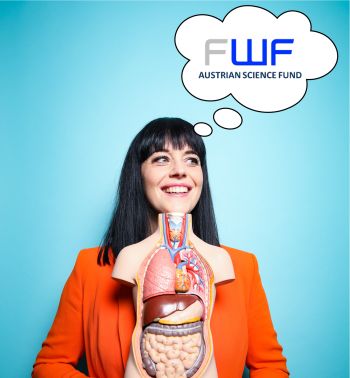
Besides transfer of knowledge in classical frontal settings, I am a strong advocate of active learning to aid the audiences’ independent problem-solving skills. In order to make learning more entertaining and fun I am always thinking about new ways of associating a positive experience with the learning process.
Back at ISTA, I have thus created an innovative teaching strategy, for which I was awarded with a science communication grant by the Austrian science fund FWF. Here, I had been implementing a Virtual Reality App, which allows the audience to actively explore the brain, distinct brain regions, brain stem cells, neuronal migration, cortical layer formation as well as the application of the genetic method used by the Hippenmeyer lab, namely Mosaic analysis with Double Markers (MADM). Thereby, the general public as well as interested scientists can now not only explore the biology of brain development, but also perform their own MADM experiment in a virtual setting and gain experience in the analysis of potential outcomes in an entertaining way. Furthermore, we have developed a short animation video that explains the MADM technology and why it is relevant for studying gene function at the single-cell level. You can find the animation video here: click link.
Now that I am a researcher at MedUniWien, I have been awarded for a second innovative, multisensory approach that specifically targets 8-10 year-old children. At this age, children are highly creative and have an exceptional comprehension of complex topics when presented in a child-friendly way. “BraiNFC” will take the audience on an exciting journey through the human brain to explain the main anatomical regions, how neurons are generated during development and which cell types can be found in the adult brain. It will then highlight the cerebellum, a brain region responsible for coordinating movements and balance. We will design a brain figurine with a near-field communication (NFC) tag to enable data transfer (in this case an audio file) to a smart device like a phone or a tablet. Since smart devices are available in almost every household, no additional technical equipment is required, thus making the product financially accessible to the audience. A hard-copy book containing illustrations will support the imaginative young mind by showing simple and child-friendly drawings of brain regions, distinct cell types and their particular features.
Here are some impressions from our workshops with the youth team supporting the optimal product development for the target audience:
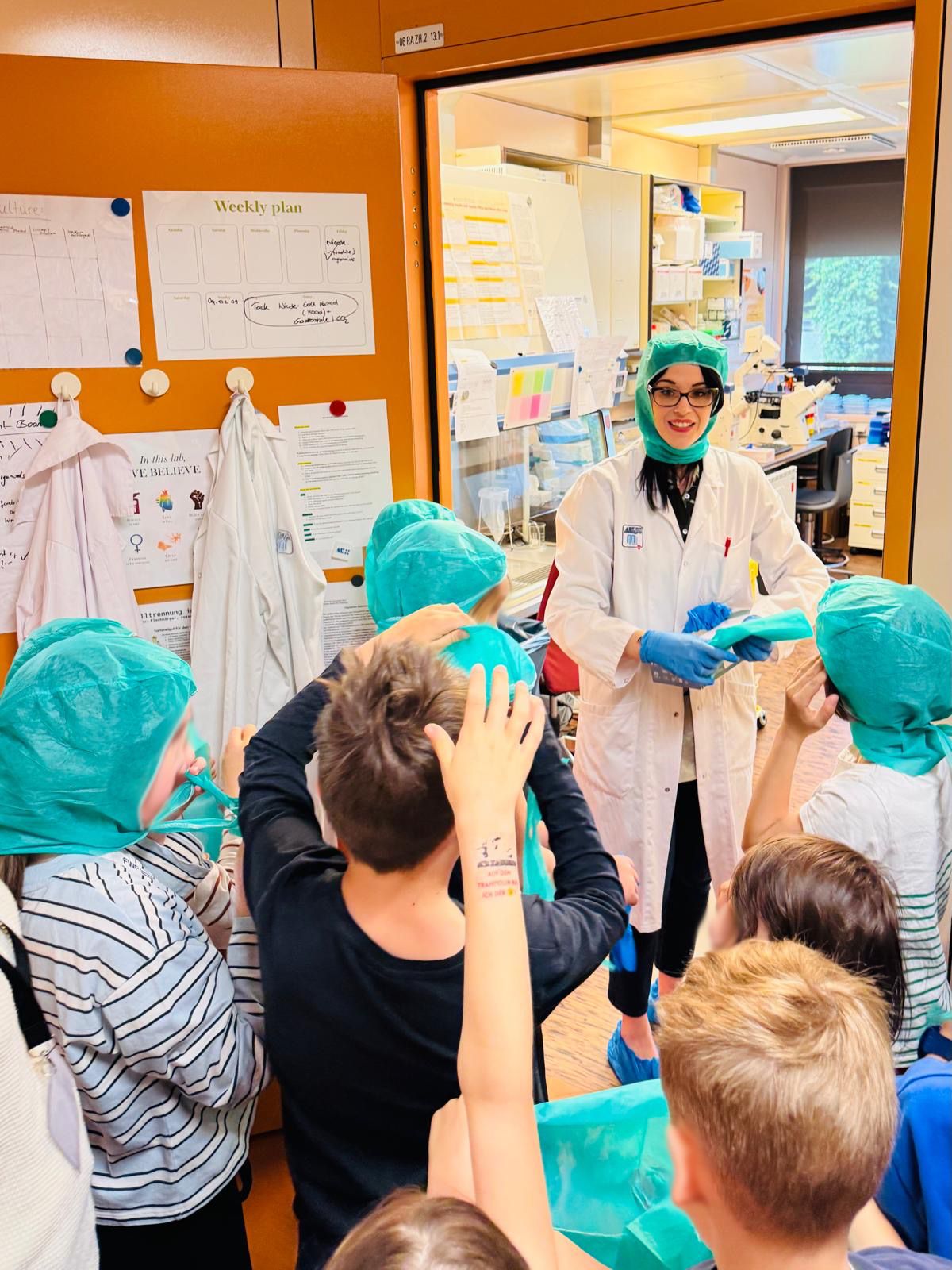
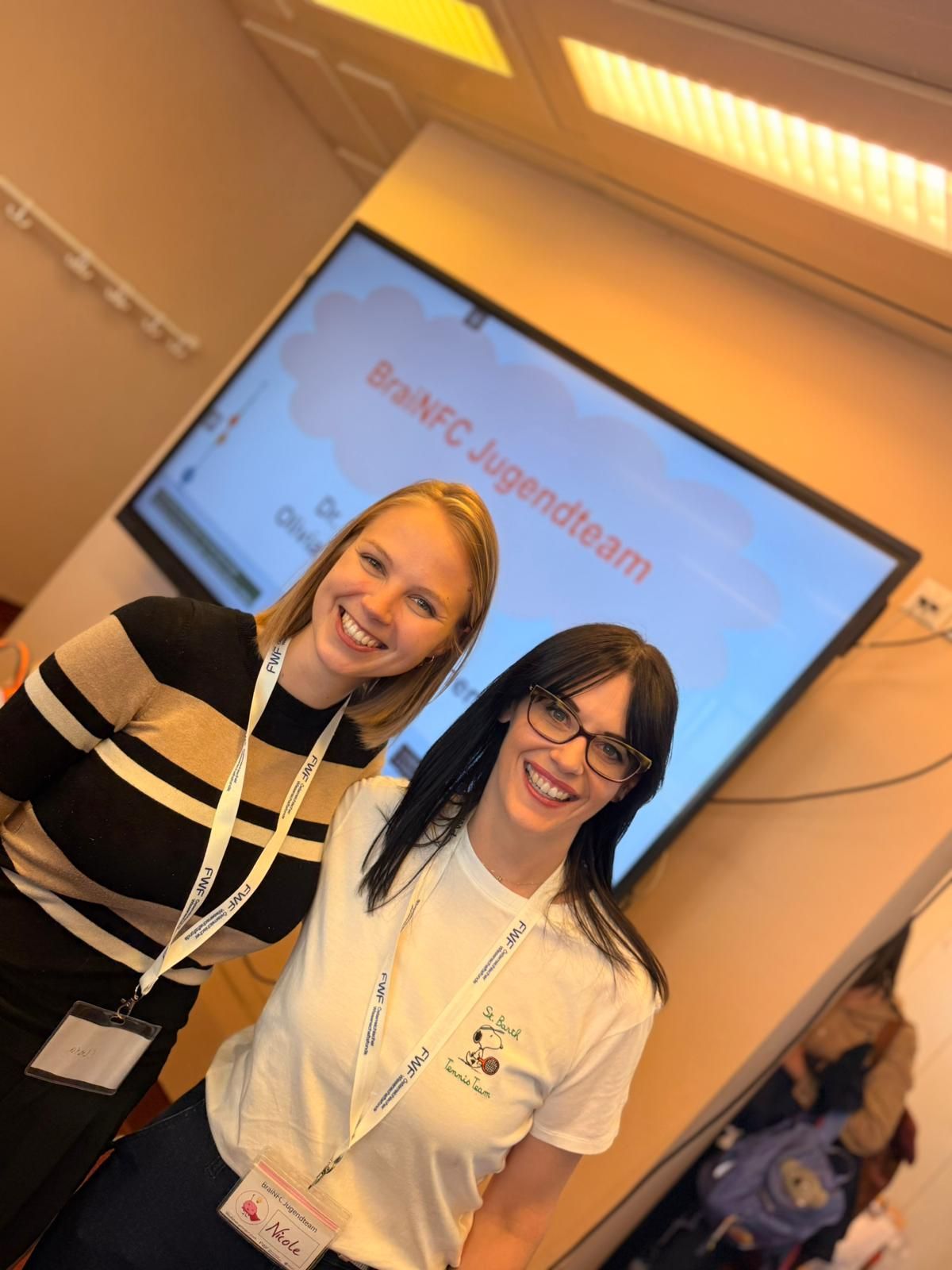

Science Outreach and Communication
I strongly feel that teaching is a fundamental duty to give back to the community as well as to invest into young generations in order to share knowledge, encourage future researchers to be curious, and support groundbreaking discoveries paving the way to the future. Therefore, it has always been important to me to engage in science outreach and community service activities, particularly science education of the general public, mostly targeting young kids and teenagers to convey the importance of science and how newly acquired knowledge may for instance transform advances in medical treatment for patients.
Award for Science Communication
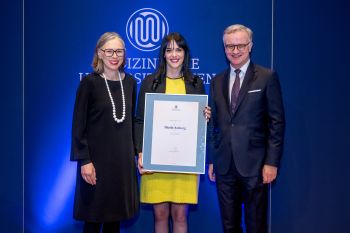
In January 2025, my enthusiasm and actions for science communication and outreach have been awarded with the Rectorate Award for Science Outreach by the Medical University of Vienna.
TV show
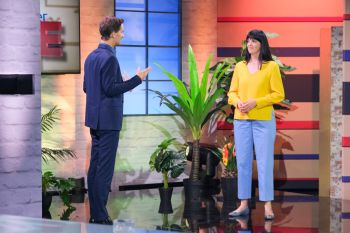
Since 2022, I am molecular biology expert in the Austrian TV show "Fakt or Fake", shown in ORF1. In the show, a team of prominent Austrian persons is confronted with memes, hoaxes, videos and headlines. It is their task to find out what is fact and what is deception. The topics include virally circulating videos and common statements from all around the world. In the end, a dedicated expert provides an easy to understand explanation and resolves the big question “is it fact or fake”.
Scientists go public
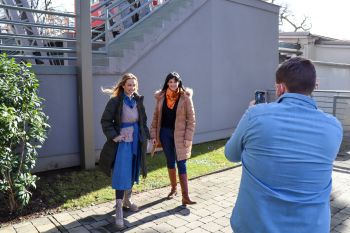
Since science often still has an elitist connotation, I support measures that break down the access barriers and offer the public and especially young people a low-threshold point of contact with female researchers. An example of this is my interview with well-known Austrian influencers Liliana Klein, in which I made myself accessible to a wide audience as a person. I don't focus too much on myself as a researcher, but on me as a private person with enthusiasm for asking and answering questions. This creates a low-threshold identification with the audience and makes researchers understandable. In general, I am strongly convinced that points of contact with a lay audience must be characterized not by showing the audience the “researcher in an ivory tower”, but by showing that researchers are accessible people “like you and me”.
Public Science Events
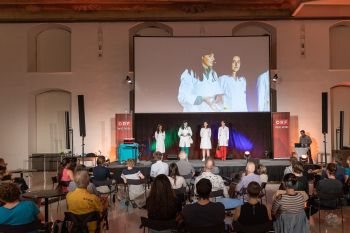
I love to participate in public science events such as the "Science Slam" and share my enthusiasm for biology. At this event, scientists present their research topics to a broad audience without using a slide presentation. In 2022, my stem cell colleagues and I were able to win the Viennese Science Slam for our presentation of brain stem cell research with the performance "Bringt Farbe ins Leben". You can watch the performance on YouTube (German only).
Promoting Girls in STEM
Moreover, I am particularly keen to inspire young girls to pursue a career in science to counteract the still existing underrepresentation of women in several science and technology professions. My activities to support this important goal are manifold:
Viennese "Girls Day" 2023
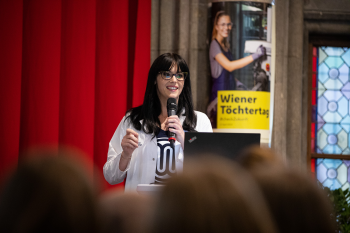
I have been honoured to be invited as a special stage event at the Viennese "Girl's Day" kick-off taking place in the town hall of Vienna, where I have successfully taken several hundred young girls on an exciting journey through our brain.
Austrian "Girls Day" 2022
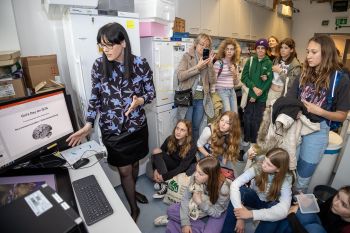
I also take part in projects funded or initiated by the Ministry for Women, Families and Youth or the Ministry for Education, Science and Research. Such projects include, for example, video recordings for "Selma will's wissen" or direct encounters with young girls on "Girl's Day" at the ISTA research campus.
Creativity Contest for School Kids
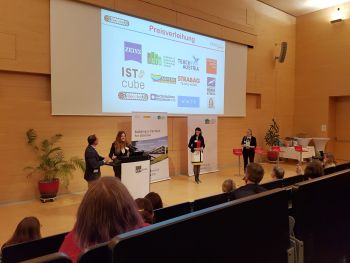
In 2022, together with my former ISTA colleague Olivia Slepecka, I have organized a creativity contest for 10-14 year old students on the topic "Women in Science". This competition was not only intended to highlight women in research, but also to draw attention to the fact that women's achievements were often ignored. At the same time, I wanted to use the competition to arouse interest in research as such and make the professional field creatively accessible.
With almost 600 participants from all over Austria, these goals were measurably achieved. A jury of well-known researchers and science media people chose the best submissions (Marc Elsberg, Ursula Poznanski, Günther Mayr, Gaia Novarino and Katherina Schmidt), and thanks to numerous sponsors awarded the winners iwth many science-related prizes (e.g. a ZEISS light microscope, programming case, LEGO robots, 3D Doodler and guided tours in the Technical Museum).
The participants and their submitted works were themselves characterized by a high level of diversity and thus show that our efforts to reach a broad audience were fruitful (share of middle schools and high schools approximately 50:50, both boys and girls, high range of media used).
For the award ceremony at ISTA, we had organized a supporting program with lab tours, during which the award winners, together with families and teachers, were able to get to know the research campus at ISTA and the scientists. A full summary can be found on the STEM fatal Initiative website.
With the competition and the supporting program of the award ceremony, we were able to achieve even more than just anchoring the topic "Women in Science" among the schoolchildren. Through the visit to ISTA and the points of contact with the researchers, many children and families were able to experience science as a professional world for the first time and bring it into their own reality.
Various reports from the winners' teachers even show that more children than usual remain in high school after the 4th grade because dealing with the topic offered them an exciting perspective and they feel supported by their school and teachers. This enabled us to influence a much larger educational framework than the original concept of the creative competition envisaged.
We therefore rolled out a second cycle of the creativity contest in 2023, this time focusing on "Women in Tech". More than 350 school children from all over Austria participated. The winners were awarded in the beautiful Art Deco Lecture Hall at the Medical University of Vienna in June 2023.